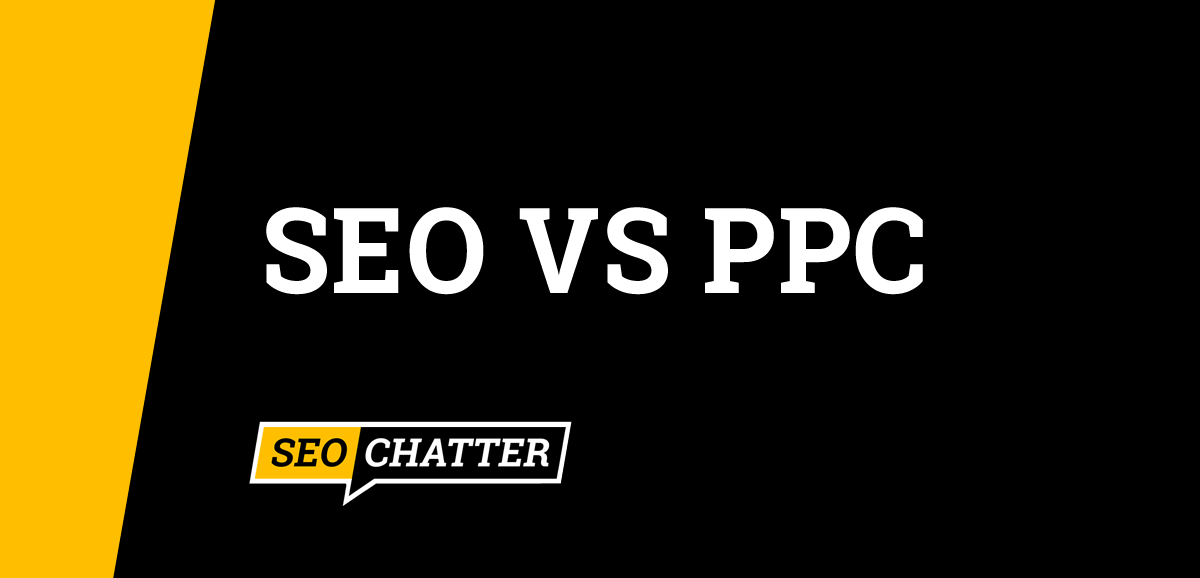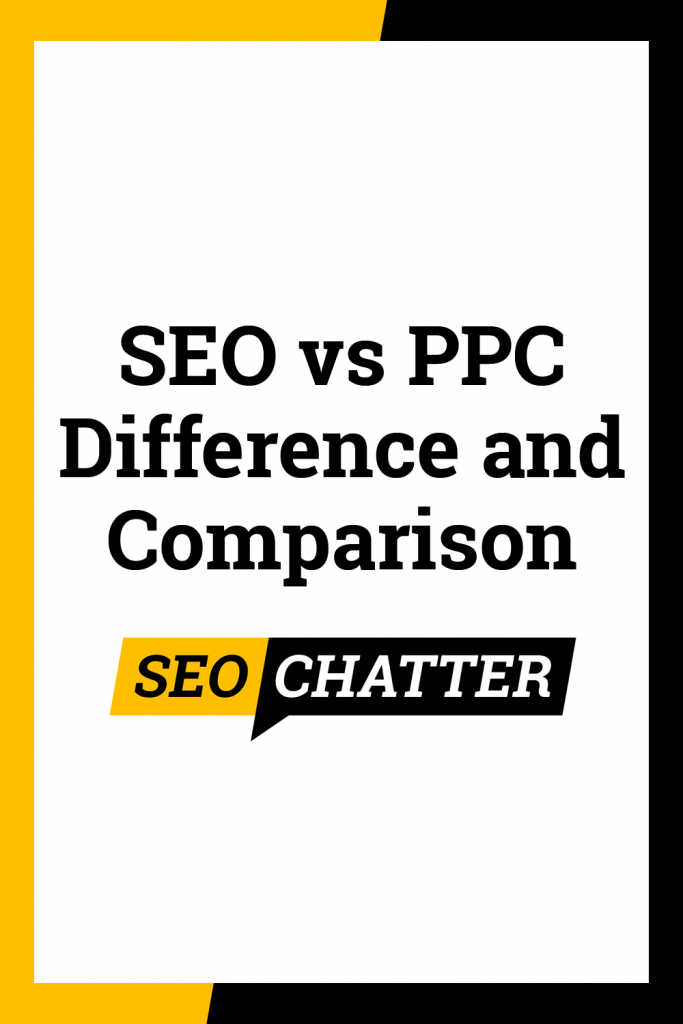While SEO and PPC may have similar results—increasing traffic to a website—these two marketing strategies are quite different.
In this post, we’ll take a detailed look at SEO vs PPC so you can understand how each method works to help you achieve your online goals.
First, I’ll explain the difference between SEO and PPC, then move onto the advantages and disadvantages of each type, and finally give you some key statistics to consider for PPC vs SEO.
By the end, you’ll know exactly where to allocate your time and online marketing dollars, with SEO or PPC.
And if you want to learn more about the benefits of search engine optimization, then be sure to check out my other posts on why your business needs SEO and why SEO is important for your online success to gain additional insight on this topic. I also have a page on SEO vs SMM, if you’re curious about those comparisons.

What Is the Difference Between SEO and PPC?
The main difference between SEO and PPC is that traffic from SEO is free while traffic from PPC costs money. Search Engine Optimization (SEO) improves organic search traffic while Pay Per Click (PPC) has a cost for each click from an ad to your website.
That’s the general idea behind SEO and PPC, but the full comparison goes much deeper.
We’ll now look at these search marketing strategies individually as well as some key statistics that show the benefits of using SEO and PPC in digital marketing. That way, you can figure out which one is better for your website.
SEO: Search Engine Optimization
SEO or Search Engine Optimization is the practice of optimizing your website and web pages to include content that can help improve their visibility in search engines like Google, Yahoo, and Bing. In other words, SEO can improve a site’s potential for showing up more often in relevant searches for free.
The hardest part of SEO is that you can’t pay money to appear higher on the search results page. As explained in my guide on what is search engine optimization, search engines use algorithms that calculate the quality and relevance of your web pages and rank your content accordingly.
Therefore, the process of SEO is trying to figure out what the search engines like Google, Yahoo, and Bing deem to be important, and then optimizing your website and web pages in a strategic way to meet that criteria.
You can easily find out what words to target by doing keyword research. Check out my post on why keyword research is important to get some tips and tricks on how to do this process.
Additionally, there are two types of SEO: on-page and off-page. To understand the differences and how you can use each type for your benefit, visit my post about on-page vs off-page SEO.
Or you can learn about each type separately by visiting what is on-page optimization and what is off-page optimization.
Advantages and Disadvantages of SEO
| Advantages of SEO | Disadvantages of SEO |
|---|---|
| Traffic is free | It takes time to see results |
| Results are long-term | Uncertainty exists |
| Good ROI | Hard to scale without a team |
| Anyone can do SEO | Mastering SEO can be hard |
| Can target any keyword | Not all keywords are profitable |
| Good for brand awareness | Less buyer oriented |
SEO Results and Statistics
- 93% of online experiences start with search engines. (Imforza)
- 95% of search traffic goes to the first page of search results. (Digital Synopsis)
- 68% of all clicks go to the first five positions in search results. (Hubspot)
- 14.6% of all SEO leads close (as opposed to 1.7% of outbound leads). (WebFX)
- 89% of marketers say SEO is successful. (Emarketer)
- 60% of small businesses that use SEO also use PPC. (Clutch)
PPC: Pay Per Click
PPC or Pay Per Click is an advertising solution where you bid on the chance to appear in ads that appear next to the organic search results. With PPC, you only pay money when someone clicks on your ad to visit your site or call your business. All search engines have a paid advertising option like this, including Google Ads, Yahoo Ads, and Bing Ads.
The challenging part of PPC is that the cost per click varies depending on the competition level and the industry. For example, you could pay $0.05 per click or $100 per click in a PPC campaign—the final cost will depend on the target keywords you choose.
Therefore, the process of planning a good PPC strategy is to find the lowest-priced keywords in your industry that deliver the highest-converting website traffic.
Advantages and Disadvantages of PPC
| Advantages of PPC | Disadvantages of PPC |
|---|---|
| Fast results | You pay for each click |
| Low level of uncertainty | Growth is tied to budget |
| Doesn’t require a team | ROI is unpredictable |
| Anyone can do PPC | Trial and error costs money |
| Can target any keyword | Cost per click varies per keyword |
| Measurable and trackable | It takes time to collect good data |
PPC Results and Statistics
- 52% of people who click on PPC ads call the advertiser anyway. (Business2Community)
- 46% of the clicks go to the top 3 paid ad spots. (Power Traffick)
- 60% of people can’t identify ads in search engine results pages. (Search Engine Land)
- 75% of people say paid ads make it easier to find what they need. (Clutch)
- PPC visitors are 50% more likely to buy than organic visitors. (Unbounce)
- Businesses generally make an average of $2 in revenue for every $1 they spend on Google Ads. (Google)
Which Is Better SEO or PPC?
SEO is better than PPC for long-term traffic and ROI. Ranking web pages for the keywords you want with SEO will get you more traffic for free than paying for those keywords with PPC. If you compare the traffic and cost of first page positions for SEO vs PPC, SEO is better.
Additionally, SEO can increase the overall authority and value of your website which leads to more consistent results. PPC does not impact your site’s authority; however, it can provide immediate results with a highly targeted audience within a time-sensitive period without worrying about having properly optimized web pages.
Over the long term, when it comes to SEO or PPC, experts agree that SEO is the most cost-effective solution and gives you a much higher return on investment than PPC campaigns. But just keep in mind that the efforts of your optimization are what determine how long does it take for SEO to take effect.
You may also want to consider adding content marketing into the mix. Because when you do, you can achieve even better results. Check out my content marketing vs SEO page to learn more about this strategy.
If you want to learn more about organic SEO in general, then visit my guide on what is organic search engine optimization.
SEO vs PPC (Full Comparison)
| SEO | PPC |
|---|---|
| Traffic is free | You pay for each click |
| Results are long-term | Growth is tied to budget |
| Good ROI | ROI is unpredictable |
| Anyone can do SEO | Trial and error costs money |
| Can target any keyword | Cost per click varies per keyword |
| Good for brand awareness | It takes time to collect good data |
| It takes time to see results | Fast results |
| Uncertainty exists | Low level of uncertainty |
| Hard to scale without a team | Doesn’t require a team |
| Mastering SEO can be hard | Anyone can do PPC |
| Not all keywords are profitable | Can target any keyword |
| Less buyer oriented | Measurable and trackable |
Does PPC Help SEO?
PPC does not help SEO in a direct way. However, PPC can help improve your SEO efforts indirectly by increasing exposure for your website. With new visitors coming to your site, you can see an increase in natural backlink acquisition. And backlinks are a ranking signal in SEO.
According to Google, “Running a Google Ads campaign does not help your SEO rankings, despite some myths and claims. However, PPC ads can be helpful in connecting with a wider audience online.” The fact is that Google’s first responsibility is to provide its users with the most relevant search results. And if a business were able to pay for higher rankings in the search results pages, then users may not be getting the most helpful information based on the search intent.
While PPC doesn’t directly impact SEO, it can still be a valuable part of a good digital marketing strategy. By investing in both PPC and SEO, you can create a more cohesive marketing campaign that grows traffic and exposure for your business.
Summary for SEO vs PPC
I hope you enjoyed this post on SEO vs PPC.
As you learned, the main difference between SEO and PPC is that search engine optimization focuses on getting free website traffic while pay per click advertising costs money to get the same types of visitors. However, both marketing strategies can be beneficial for improving the online visibility of a business when used together.
If you’re trying to decide which strategy to use right now, SEO or PPC, then it’s best to figure out what the current goals are for your business. If you want the lowest-cost with the highest ROI, but don’t mind waiting to see the results, then choose SEO. But if you need instant traffic and don’t mind paying for it, then choose PPC.


SEO Chatter is dedicated to teaching the fundamentals of search engine marketing to help marketers understand how to increase organic website traffic and improve search engine rankings.

